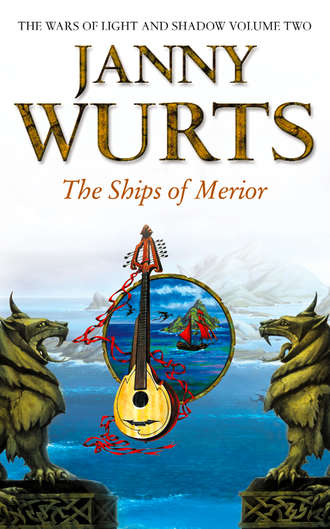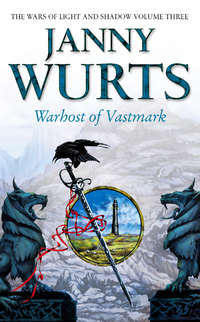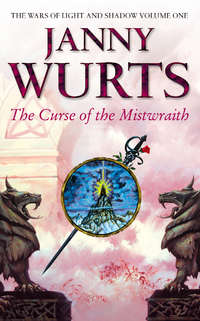
Полная версия
The Ships of Merior
‘You already confiscated my saddle bags!’ Dakar yelped in outrage. ‘You’ll know I don’t carry any coin.’
‘You’re not lacking friends.’ The mayor swivelled porcine eyes toward the elegant figure of the Master-bard. ‘They may balance the debt for you, should they be so inclined. It is to them you must now beg for clemency.’
They have nothing to do with me,’ Dakar insisted between frog-flop attempts to wiggle free.
The Lord Mayor raised his eyebrows. ‘Then what brings them to Jaelot?’
‘You speak of Halliron Masterbard and his apprentice.’ Dakar stopped struggling, appalled to unwonted seriousness. ‘They ask nothing more than license to practise their art. There’s not a town anywhere that wouldn’t welcome their presence.’
The alderman’s fishy eyes completed their inventory of glittering silk and cut topaz. ‘Is this true?’
Halliron swept to his feet. In a voice burred rough by his cough, but modulated to lyrical acidity, he said, ‘What’s true is that no man alive owns the sum Jaelot’s court of justice sees fit to demand.’ The barbed threat of satire behind his inflection rang without echo into silence.
The Lord Mayor fluttered a hand in capitulation. ‘Well then. We’ll mediate the sentence, naturally. Since my lady was the party offended, it’s fitting that she gain compensation. The spoiled moulding cost four hundred royals, true-silver. The carter’s list of damages will be compiled and paid off to the penny. The city’s fine I will waive on this condition: that Halliron Masterbard entertain my lady’s guests at the feast upon mid-summer solstice.’ A glistening, toothy smile parted the mayor’s lips. ‘License to practise your art, if you will, before this city’s finest. If your playing matches your reputation, no doubt, folk of pedigree will shower their gold at your feet. You might even earn a tidy profit.’
Medlir’s lightning surge to arise was stopped by a feather touch from the bard.
From the floor, Dakar gagged in strangled outrage. ‘That’s rank insult.’
The secretaries’ nibs scraped through a poisonous silence. Halliron, white hair thrown back, light eyes fixed on a point midway between ceiling groins and dais, said nothing. Medlir’s poised stillness showed tension more appropriate to a swordsman than a singer, while the halberdiers who were not one whit ceremonial shifted their balance to readiness.
Strangely desperate, Dakar said, Don’t answer. I don’t require it.’
What bargains you strike between yourselves are entirely your personal affair.’ The mayor parked his hands amid the foamy lace of his waistcoat. ‘The city’s terms will stand: either pay the fine or render performance, with enforced restriction to remain inside city walls until the terms of the sentence are met. You have seven days in which to give your decision.’
At the edge of the candle’s pooled light, the judiciary’s smirk flashed like the teeth of a feeding shark. ‘Set the record.’ His attention brushed Halliron, then bent dismissively to share his amusement with the alderman. ‘It’s a convenient arrangement, since the offender’s stint at forced labour will expire near the same date.’ To the bard, he added gently, ‘Of course you could decline the option. Your companion would then languish in prison till he dies, or his debt to Jaelot is paid.’
On the dais, a striker flared in a scribe’s veined hand. The scent of heated wax curled through the smell of roses, the tang of stale citrus and the unwashed heat of despair that clung to the prisoners uneasily awaiting their turn at trial. The secretaries raised sharp knives and busily resharpened their pens, while the alderman brandished the city seal and impressed Jaelot’s lions on four documents.
‘Case dismissed,’ intoned the judiciary.
The carter pressed forward to cite his damages, while before the marble dais, the men at arms hoisted Dakar upright by his manacles and towed his bulk from the hall. Stumbling and wordless, the insouciance of yesterday bled out of him, he never once turned his head in appeal; while Halliron and Medlir made swift departure through the crooked stair that led upward into the daylight.
Later, in a dingy garret room where winter winds tore at loose slates, and draughts flowed and creaked through the gaps in warped shutters, Medlir sat over a mug of spiced wine, his flattened hands tapping a jig tune on the chipped and dingy porcelain. ‘Will you let him off?’
‘Was there ever any question?’ Four hundred and sixty royals of their store of coin had already been dispatched to the lumber mill and the wheelwright’s coffers. Halliron sat on the pallet opposite, swathed in quilts and coach rugs taken from the pony cart’s baggage. The inn’s bedclothes had been banished into care of the laundress; if this establishment maintained any servant to fill the post. Scraping an idle fingernail through the grime on the bed boards, Halliron was inclined to think not. ‘Your obligation to Asandir must take precedence.’
Medlir jerked his chin up. ‘It does not.’ The fluttering tallow dip underlit his face, lending baleful emphasis to his anger. ‘The Fellowship sorcerers would agree. Your business is in Shand, not in mending the Mad Prophet’s excesses.’
Halliron tisked gently. His slow grin unveiled gapped front teeth. ‘I can teach you as readily here as in the south. Shand can wait.’
‘If six months in Jaelot doesn’t contrive to ruin us both.’ Medlir’s veneer of irritation dissolved as he arose to add billets to the ill-vented hearth, burned down to a smouldering, sullen bed of coals that belched smoke at each breath of wind. As the new wood caught, he sighed. ‘All of this concerns my life before I accepted your apprenticeship. I’d rather you weren’t burdened.’
‘You’re more to me, now, than an apprentice.’ Fresh flame curled up, laying a bronze patina over the spider-tracks of wrinkles that scored the bard’s skin, and gilding age-chiselled face-bones still windburned from the open road. ‘And anyway, you’re the one most inconvenienced. I shouldn’t care to stand in your shoes when the Mad Prophet discovers you’ve deceived him.’
His back turned, Medlir shrugged. ‘Forced labour won’t give him much chance.’
Eyes clear as sky studied the tension in the younger man’s shoulders; noted the absorbed, almost desperate focus he bent upon the slate apron beneath his boots. As if his eyes could see into soot-dusted, grainy layers of stone, and perceive the dance and spark of primal energies that laced its matter into being; as indeed, Halliron knew, they once had, before raw abuse of such powers in Deshir’s defence had raised barriers. A mage once trained to know the mysteries was unlikely to forget the awesome, wild winds of destruction a binding of unmaking could unleash. Backlash and scarring had rendered the spirit blind and mute.
With a gentleness roughened by the congestion in his chest, the bard said, ‘Be patient. The sight will come back to you. Nature offers more than one path to perception, and your musical gifts may grow to compensate.’
The one who named himself Medlir raised hands to cover his face, the beaded ends of unstrung laces swinging and tapping against his knees. He crouched so for a long moment, then gathered himself, stood up, and turned toward his master an expression of unspeakable pain. ‘I’ve felt the power stir in snatches, an echo here and there between notes.’ His frustration revealed his difficulty, that he could not accustom himself to the change. The energies he had studied as pure spirit light felt indecipherably strange, transliterated to vibration and sound.
Halliron’s smile held bedrock firmness. ‘Well, work at it. Six months in Jaelot will certainly leave you the time.’
The Masterbard’s apprentice returned a clipped sigh and bent to unwrap the lyranthe. He extended a foot in a swordsman’s move and hooked the chamber’s one stool. Its broken brace scarcely troubled his poise as he perched on the rat-chewed rush seat.
‘Give me the Ballad of Taerlin Waters,’ Halliron said. ‘Mind you don’t slur the runs in the third bar, or the grace notes that lead into the chorus.’
Medlir flicked back the untied gusset of his cuffs to free his fingers for tuning; here, where disguise was not needed, firelight caught raw and red on a scar that grooved the flesh in a half-twist from right palm to elbow. The hair that fronded his cheek as he bent to the sweet ring of strings was no longer the bland, ash brown Dakar knew, but glossy black as chipped coal.
His eyes, when he finally raised them to sing, were as penetrating a green as the royal ancestor whose natural looks he had inherited.
Links
Before the spring winds thaw the Mathorn Pass, Lysaer s’Ilessid, Prince of the West, rides out at the head of a cavalcade bound for ruined Avenor, his fair betrothed at his side; with him, under heavy escort of Etarran men at arms and ex-mercenaries sworn to feal service, travel a hundred wains bearing funds for his city’s restoration, and tapestries, chests, fine furnishings and the jewels apportioned as his lady’s dowry…
The journey of the royal retinue is marked by covert bands of scouts who relay word through messengers to the borders of Rathain and beyond; until news of Lysaer’s movement is shared by clansmen who muster in deep, hidden glens against the day that Prince Arithon may have need of them…
On the east facing-wall of Jaelot, whipped by cold airs off the bay, the man who is prince and fugitive, Master of Shadow and Masterbard’s apprentice, sends a request intended for Sethvir, Fellowship sorcerer and Warden of Althain Tower; and his missive is not scribed on parchment, but in his own blood upon a flake of slate that he dries over live flame, then tosses into the heaving breakers at high tide…
III. FIRST INFAMY
Committed as an impulsive donation by Etarra’s Governor Supreme to the ruined city Prince Lysaer undertook to restore, Lord Diegan, ex-commander of the garrison, sat his glossy bay warhorse and glared through the pennons that cracked at the head of the unwieldy column bound for Avenor. The gusts off the Mathorn’s high slopes still bit like midwinter; as unforgiving were Lord Diegan’s eyes, bleak and flat as black ice.
He wore the trappings of an Etarran dandy; intrigue still drove him as naturally as each drawn breath, but five summers spent in the wilds on campaign against forest barbarians had tempered him. He knew when boldness would not serve him. Yet masterfully as a man could contain himself, last night’s argument had flared too hotly to be masked behind banality. Lord Diegan found himself glaring once again at the blond-haired prince who rode to his left.
Clad for travel in blue-dyed suede and a cloak of oiled wool, his hair like combed flax under the gold-stitched velvet of his hat, Lysaer s’Ilessid adjusted his reins in gloved hands and suddenly, generously smiled. Still looking forward, as if the roadway behind were not packed with a chaos of groaning, creaking wagons and the whip snaps and epithets of bored carters, he said, ‘Still angry? At least that way you’ll keep warm.’
Too raw not to rise to provocation, Diegan felt his horse startle and jig. Annoyed to have dug in a thoughtless spur, he snapped, ‘I still can’t believe you’re dragging my sister Talith into this.’
Lysaer turned his head. Eyes as brilliant as glacial ice touched Diegan, then flicked away. ‘Be careful. Don’t let me think you believe I take her so lightly as to cast her into needless danger.’
Had Diegan not needed both hands to settle his sidling mount, he could have struck the prince in exasperation. ‘Ah, Ath, why won’t you listen?’ No need to repeat those facts already thrashed through: that town mayors in the kingdom of Tysan had never seen the horrors of the Shadow Master’s powers; to them the massacre that broke an army in Strakewood forest was history told at second hand. Of more immediate concern were the fragmented archives which survived the ancient uprising that first overthrew Athera’s high kings. If few guilds and merchants recalled the truth, that the same barbarian clans who plundered their trade goods once had ruled their cities, Erdane’s mayor was not among them. Scathing letters from his barristers on the subject outlined the ramifications: s’Ilessid blood made Lysaer the last legitimate royal heir and no city in Tysan cared to risk a return to crown rule.
Heated now beyond restraint, Diegan burst out, ‘You know you’ll be arrested and condemned as a dissenter? In Isaer, likely as not, they’ll throw you to the headhunters’ mastiffs. Sithaer’s Furies, man, just for some mouldy historical right to lay claim to clan fealty, you’re the living embodiment of these peoples’ fear of insurrection. I don’t care to see two hundred Etarran soldiers give up their lives to keep you from being savaged by a dog pack!’
‘Well then,’ Lysaer said equably. ‘The Etarran division will be sent home before any political misperception can arise to start any bloodshed.’ In maddening, single-minded majesty, he looked straight ahead as he added, Diegan, this issue is greater than me, more important than Tysan’s disorders. Somewhere in hilling, the Master of Shadow weaves plots. Sitting secure in Etarra flushing out barbarian encampments is never going to make him show his hand.’
To which Lord Diegan could do nothing but clench his jaw, wheel his courser out of line, and pound off at a canter to review the order of his troops. Speechless in frustration, he wished he had a lance in his hand and a living target to skewer. For it was never Lysaer’s dedication to the cause of killing Arithon s’Ffalenn that had been under contention; only the folly of allowing the Lady Talith to believe herself secure amid the troop who rode out to renew s’Ilessid claim to Avenor’s charter.
Prince Lysaer’s cavalcade travelled westward at a pace its seasoned war captains concurred was better suited to the staging of an invalid’s retinue. Those mercenaries with prior experience of moving troops complained mightily to their superiors, then arranged rough drills in the open camps to keep their cohorts smart. Unused to being fresh and idle, their men at arms diced and got fractious with each pause. Settlements and towns along the Mathorn road were favourably disposed toward Lysaer’s retainers, since the barbarian raids out of Halwythwood that distressed their trade had eased through Etarra’s campaigns. Lord Diegan grew accustomed to state dinners followed by exhaustive mornings of fielding grievances.
For the royal cavalcade grew longer, more massive, more weighed down with gifts with every city it passed. If the Prince of the West journeyed into his ancestral kingdom to win allies against the Master of Shadow, each mayor and guild left inside Rathain’s borders set themselves to ingratiate. However they might disparage royalty, they needed Lysaer’s goodwill lest the dreaded sorcerer think to turn on them with impunity once the prince who had defended Etarra was gone. The aftermath became familiar unto habit. Diegan sat in some draughty tent with a lap-desk, grim-faced as he battled the breezes that snatched at his lading lists and tiresome tallies of wagons. From Narms, they had five loads of carpets and woven silk, sumptuously coloured; from Morvain, downcoast, wool bales profitably traded for crystal from the famed glassworks at Falgaire. They had lanterns in wrought brass, barrels of rare wines and brandies, and from some beneficent farmer, foundation stock for a pig herd.
Lord Diegan came to wince at the creatures’ squeals, much as he did when the camp followers shrieked obscenities at cheating customers. Whatever Lysaer believed, a war camp was no place for anybody’s pedigree sister.
Since the baggage train made transport by water impractical, the prince’s retinue crept by road around the shoreline of Instrell Bay. Caught by a late-breaking ice storm, they crawled over the low pass at East Bransing, which parted the weathered summits of the Storlains from the furze-cloaked hills that northward gave rise to the loftier spur of the Thaldeins.
Despite Lord Diegan’s forebodings and a hostile letter of warning delivered by mounted courier from Erdane’s reigning mayor, the cavalcade crossed with the thaws into the realm of Tysan, past seat of the s’Ilessid high kings.
Camped in pastures, quartered in hay byres, they bought wood, milk and early greens from red-cheeked country matrons. To Diegan’s everlasting uneasiness, the company blatantly proclaimed itself to the eyes of every passing shepherd. The bellying, bullion-fringed standard with its brilliant blue cloth bore a sigil not seen for five centuries: the royal twelve-pointed star of pale gold. The curious came out to stare in droves. Whatever the sentiments held by city governments and their mettlesome packs of trade guilds, the crofters of Tysan lent tacit trust once assured the prince’s captains would pay for provender. Young boys watched the marching men in their helms, shining mail, and the bright, sharp steel of their longswords, and dreamed; or else turned up in holed boots and motley tunics, reeking of cow dung from the tilling and begging to be taken on for training.
Lysaer s’Ilessid turned none of them away.
‘Why leave them on the farms where their families must struggle to feed them?’ Oblivious to the squalor, he sat by the hearthside cracking nuts for Lady Talith in a peasant’s croft near Dyshent. Crickets chirruped in the smoke-grimed shadows of the corners and round-eyed children peered through the boards of the cattle stalls, where the matron had locked them for safety. Outside, amid a glitter of campfires, the fighting force sprawled at their ease in the mild night, while the off-duty watch laughed and cast bets, and the day’s new recruits dug pits for latrines behind the thorn fence of a sheepfold. Attentive to the timbre of the officer’s calls that wafted through opened shutters, Lysaer added, ‘These boys’ skills will be sorely needed later. Any unsuited for our fighting force will be given land of their own to husband, once Avenor’s rebuilt.’
‘If we ever get there,’ Lord Diegan grumbled acidly. Dark where his sister was leonine, he dug his knuckles into eyes gritted raw from the dust thrown up by his prince’s ridiculous train of wagons, columns of light horse and pack-mules. The rains ended earlier since the banishment of Desh-thiere’s mists; if the past plagues of bloodsucking insects were lessened, the air hung as close as new summer. ‘We’ll need to cut tents out of carpets, at this pace. Next winter’s frost will catch us before we can raise a roof to keep the rust from our weapons stores.’
‘Spend the cold season in Erdane with Talith, then,’ Lysaer said, and grinned in suave provocation. He wore neither doublet nor shirt. Since his offer to sling yoke buckets in from the dairy, the matron had carped until he stripped off his fine silk. Afterward, nobody remarked that his lack of finesse in the farmyard had left him bespattered with milk. Unjustly magnificent in fitted breeches of blue suede embroidered with seedpearls, he leaned down and scooped another nut from the poke by his ankles.
Across the cottage, the farmwife’s daughter thumped her chum, her gaze never leaving the beautiful prince, except to stab in envy at the tawny-haired lady who curled like a cat at his knee.
‘Or else go back to your Lord Governor in Etarra,’ Lysaer resumed, well aware of his captain’s coiled tension as he flipped up and fielded a nut-meat. ‘The Etarran division will return as I promised, once we reach the crossroad to Camris.’
‘You can’t be serious about that!’ Lord Diegan’s sharp movement rucked the braided hearth-rug and upset the little sack, and nuts cascaded into the embers. ‘You’re carrying the endowment to found a city, and -’
‘And what?’ Lysaer stretched and pecked a kiss on Talith’s cheek, letting her retire before the debate could encompass the Master of Shadow. Left to the censure of her brother, the prince stayed unmoved. ‘This is Tysan. My ancestors ruled here.’
‘For which Erdane’s mayor sent an edict to draw and quarter you!’ Hot in his velvets, Lord Diegan endured discomfort rather than let the dairy girl make unflattering comparisons. ‘The fanatics on his council will have troops out to slaughter your bodyguard before you’ll gain passage through his town.’
Lysaer looked back in reproach. ‘These are my people, Diegan. However I have to win my way past Erdane, whether my troops come to shelter under carpets or wind-breaks cut from our best murray silk, I won’t cross this land in such haste that I cannot understand the land’s needs.’
‘Sithaer take your royal principles, I’d do better arguing with a half-wit!’ Lord Diegan stood, the jingle of his spurs cut by the crunch of scattered nuts as he stalked past the fire and escaped to nurse his pique outside.
The cavalcade pressed on at its snail’s crawl upcoast to Dyshent, over roads rutted deep by the passage of the season’s last lumber sledges. While the chip fires used to season beech blocks skeined dusky smoke above the houses, the prince’s guard troop quartered in yards piled with bark for the tanner’s, or between their own laden wagons, parked amid stacks of green planks. In complete disregard for the craftsmen who spat in the path of his retinue, Lysaer visited the guild halls and the town ministry. Gold saw his officers billeted in the sheds used to season rare woods, and his lordly good manners won over the councilmen’s wives.
Diegan waited, edgy as the captains who lost sleep to stop their men from making trouble; but the deep-seated resentments toward Tysan’s royal blood failed to spark into contention.
Lysaer took leave of Dyshent’s council and rode out in proud form before his cavalcade.
Unappeased, Lord Diegan forced his mount to pace Lysaer’s. ‘This isn’t Isaer, or Erdane, where a few costly gifts can turn heads.’
The peaked roofs of the city’s mills were by then lost to sight. Ahead stretched league upon league of wild downs. Rounded, scrub-clothed hills cradled the stones of a Second Age ruin, and chipped old arches lay throttled under greening trailers of bitter vine. There, where wispy marsh-lights flocked the fogs on dank nights and the spirits of long-dead Paravians were rumoured to wander abroad, no town-bred company cared to linger. Astride his steaming, mud-spattered courser, Lysaer drew firm rein, while behind, in a welter of belatedly shouted orders, his massive column blundered to a stop.
Straight-shouldered in a hooded cloak pinned with a sapphire, the prince waited, while the mists licked through the air between. ‘Are you for me, or against?’ he asked softly.
Lord Diegan ignored the chill that grazed the length of his spine. He strove to stay angry, to outmatch that worldly gaze which caught and pierced him to the heart. But like an onset of sudden pain, emotion wrung the truth from him. ‘I fear for you, friend. You’re the only man we have whose gift of light can match the Shadow Master’s sorceries.’
‘Then give me your trust,’ Lysaer said. ‘Worry does nothing, after all, but undermine morale and abet the cause of an enemy ruthlessly prepared to exploit every one of our weaknesses.’
The next day, they reached the crossing of the Great West Road. Against every reasonable inclination, Lord Diegan presided over commands shouted through a misery of rainfall as the crack Etarran divisions he had personally selected to protect his prince were split off and turned back to Rathain.
Afterward, with the downpour a fringe of silver off his mantle, Lord Diegan huffed through the runnels that channelled through his moustache. “By Ath, I’ll trust you have a plan. Would it strain your royal pride too much to share it?’
‘You couldn’t guess?’ As sodden as the house staff and officers who attended him in gloomy huddles, but oddly outside of their misery, Lysaer shook back wet hair and laughed. ‘My Lord, your Etarrans are too loyal. All filled with brash courage and intent to ruin Arithon, which is just what we’ll do on a battlefield. But since then-numbers are too small to flush out the Shadow Master, just now their sentiments could cause problems. For our safety and theirs, they can’t be risked.’







